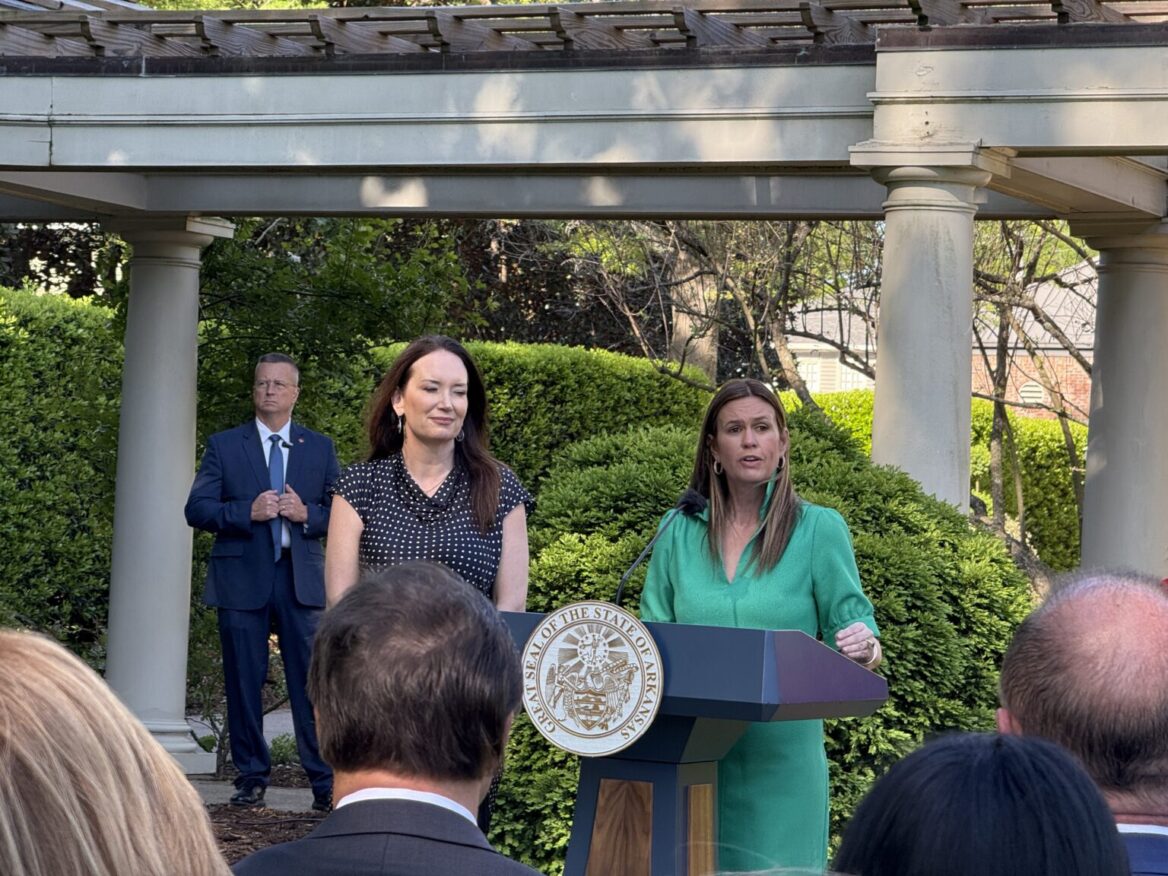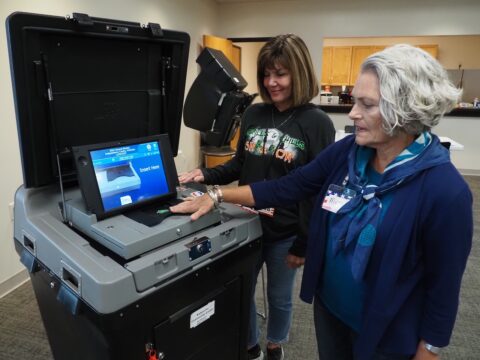BY: AINSLEY PLATT – APRIL 15, 2025 2:57 PM
The state of Arkansas submitted a waiver Tuesday to the U.S. Department of Agriculture seeking to ban food stamp recipients from using the benefit to purchase soda and candy.
Arkansas is among the first states to request these restrictions for Supplemental Nutrition Assistance Program (SNAP) beneficiaries, with Gov. Sarah Huckabee Sanders citing President Donald Trump’s “laser focus” on solving America’s “chronic disease epidemic” as a motivating force.
Sanders announced the waiver submission alongside U.S. Agriculture Secretary Brooke Rollins and Arkansas Human Services Secretary Kristi Putnam at the Governor’s Mansion Tuesday, with a stated goal of having the waiver approved and the proposed restrictions in place by July 1, 2026.
The second Trump administration has been pushing to “Make America Healthy Again” since Trump retook office in January, with U.S. Secretary of Health and Human Services Robert F. Kennedy Jr. frequently railing on ultra-processed foods and other foods he said are contributing to poor health in Americans.
Sanders echoed those sentiments during her remarks Tuesday.
“Our country spends $119 billion dollars each year on food stamps. Twenty-three percent of that spending, which is $27 billion annually, goes toward things like soft drinks, unhealthy snacks, candy and dessert,” she said. “At the same time, our state Medicaid program spends at least $300 million each year treating chronic illness. Taxpayers are subsidizing poor health — we’re paying for it on the front end and the back end.”
“That’s not a nutrition program,” Sanders continued, “it’s actively harming Arkansas’ health and contributing to our nation’s mountain of debt.”
Adding rotisserie chicken
The exclusion of soda and candy would not decrease overall SNAP benefits received by beneficiaries, she said, but would rather free up more of their benefits for healthier foods.
In addition to banning the purchase of soda and candy, including zero-calorie soda, the state also requested that “low and no-calorie soda, fruit and vegetable drinks with less than 50% natural juice” and “unhealthy drinks” also be excluded from the list of foods eligible to be purchased with SNAP money.
Foods considered candy in Arkansas’ waiver request are “confectionary products with flour and artificially sweetened candy.”
“At the end of the day, we will never restrict choices of you, of myself, of others,” Rollins said. “What we’re working to do is make sure that taxpayer dollars — that when government is involved, and when they’re spending the money of our people — that that money is being spent wisely and in the best way we know how.”
Arkansas is also asking the federal government to allow SNAP recipients in the state to use their money to purchase rotisserie chicken.
“The State also proposes to distribute SNAP Education nutrition program funding directly to schools, food banks, and other community agencies so they can distribute healthy foods such as fruits and vegetables to families and provide education and outreach about healthy food choices,” the waiver request reads.
Rollins said that as she and Sanders were addressing the small crowd at the Governor’s Mansion, Kennedy was in Indiana for “a similar event” with Indiana Republican Gov. Mike Braun.
Putnam, whose department oversees SNAP and federal health insurance programs for Arkansas, said allowing the purchase of soda and candy with SNAP benefits subsidized unhealthy nutritional choices.
“We’re devoting … significant resources to treating the same health conditions brought on by consuming unhealthy food,” Putnam said. “This makes no sense. … Why do we contribute to poor health in one program and then try to fix it in another program?”
Industry objections
Food industry groups immediately decried the state’s request. The American Beverage Association, an industry group for non-alcoholic beverage companies, criticized Sanders and Rollins for “choosing to be the food police rather than take truly meaningful steps to lift people off SNAP with good-paying jobs.”
GET THE MORNING HEADLINES.SUBSCRIBE
“Make no mistake, this waiver won’t make an ounce of difference on health,” the ABA wrote in an emailed statement. “If Governor Sanders is serious about making Arkansas healthy again, this would be a comprehensive effort — not one narrowly focused on excluding one population from buying just two sets of products in the grocery store.”
Meanwhile, the National Confectioners Association called the move “misguided and not needed,” citing data released by the USDA in 2016.
“SNAP participants and non-SNAP participants alike understand that chocolate and candy are treats — not meal replacements,” said Chris Gindlesperger, NCA’s senior vice president of public affairs and communications, in an emailed statement. “In fact, candy purchasing patterns are basically equivalent between SNAP and non-SNAP families — with only 2% of SNAP purchases being candy. Consumers have a unique mindset when they enjoy chocolate and candy that is not present when interacting with other foods — whether or not they are using SNAP benefits for food purchases.”
According to that same study, 20 cents of every dollar spent by both SNAP and non-SNAP recipients went towards “sweetened drinks, desserts, salty snacks, candy, and sugar.” Soft drinks specifically made up 5.44% of a SNAP household’s expenditures, according to the study, which relied on purchasing data from 2011.
“The SNAP program is designed to help those in need of assistance, not to hurt them,” Rollins said. “It’s also funded by the American taxpayer, who deserves a say in how the program is administered and what the program funds. President Trump has given his administration, our administration, the mandate to make America healthy again.”
The state is implementing what Sanders described as a voluntary 30-day public comment period on the waiver.
As Sanders and Rollins were speaking at the mansion, state lawmakers at the Capitol about two miles away debated a bill Tuesday morning that would require the Arkansas Department of Human Services to submit a waiver to exclude candy and soda from being eligible for SNAP money. Senate Bill 217, sponsored by Sen. Clint Penzo, R-Springdale, would require DHS to continue submitting the waiver request every year if it is denied.
Dennis Farmer, president of the Arkansas Beverage Association, spoke against the bill, saying such legislation would put a “scarlet letter” on producers of the targeted products. Just because the state won’t pay for it, doesn’t necessarily mean it will change SNAP beneficiaries’ consumption behavior, he said.
Arkansas Advocates for Children and Families also spoke against the bill.
“While we appreciate the positive intent, the bill would be an example of unnecessary government intervention in people’s daily choices, and it kind of misses the mark when it comes to ensuring better health outcomes for low-income families,” said Christin Harper, AACF’s policy director.
Harper said the administrative complexity of implementing restrictions such as the ones proposed in the bill would be “costly and confusing.”
“A lot of candy bars have chocolate and nuts but, as has been mentioned, so do a lot of granola bars,” Harper said. “So this potentially introduces a slippery slope in terms of debating what foods are healthy or not, good or bad, and puts an additional stigma on those receiving SNAP benefits.”
Incentive-based programs have been shown to produce healthier outcomes, she said, “without restricting people’s autonomy in their grocery shopping.” More focus needs to be given to the root causes of poor health outcomes, such as poverty, unstable housing and access to medical care, she added.
The committee ultimately voted along party lines, 12-5, to advance the bill to the full House.




